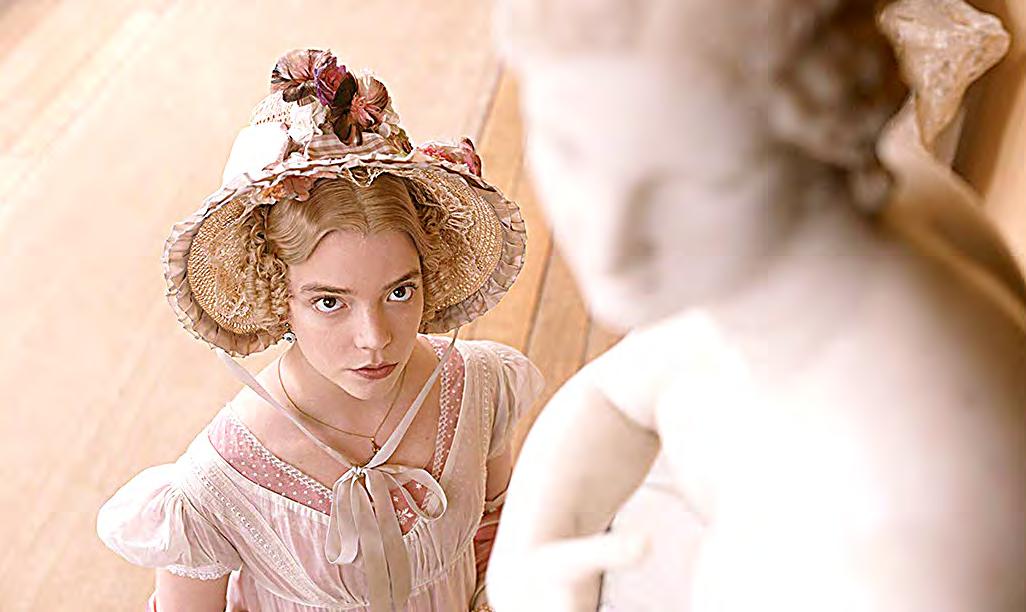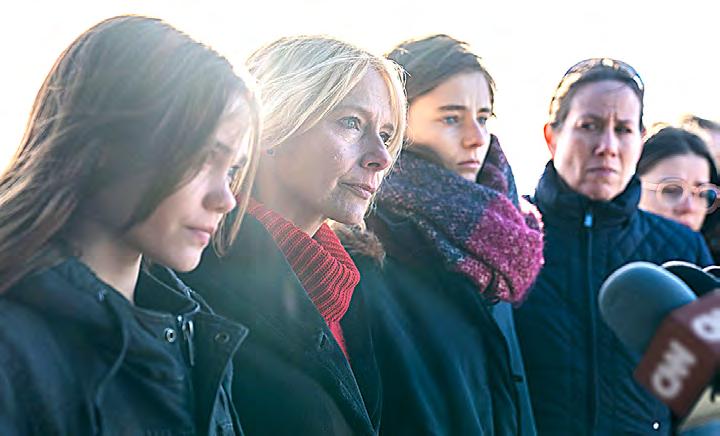
5 minute read
FiLM + ON SCREEN
Amy Ryan, center, in the Netflix original movie Lost Girls.

Advertisement
Anya Taylor-Joy in Emma, which was just released in theaters is now available through video on demand. ▲
Serial-killer thriller with a welcome spin New Netflix movie places focus on forgotten victims
Lost Girls
out of 5| 95 min. |R Reviewed by MaryAnn Johanson
It seems churlish to say such a thing about a clearly very necessary film, but Netflix’s Lost Girls isn’t terribly engaging. That’s a problem, because the way to bring in the audience that needs to see it most is to be as gripping as possible. A spoonful of sugar, and all that. I hate feeling this way— that a movie about something so serious should be “entertaining” — but I do want folks to see it and stick with it long enough to actually hear what it has to say. On paper, Lost Girls sounds electrifying. This first narrative feature from documentarian Liz Garbus (twice nominated for an Oscar, most recently for 2015’s What Happened, Miss Simone?) — offers exactly the sort of twist on a familiar story I would expect from a filmmaker like Garbus, who has long been a champion for the girls and women society misunderstands and overlooks. Movies about murdered prostitutes and serial killers who prey on women are so ubiquitous as to be banal, and these stories tend to be about the cops or lawyers investigating the crimes to which they have fallen victim, and not about the women themselves. But Garbus puts the focus where it belongs, and where it should always have been: on the victimized women. This part of the story is true: In 2010, a 20-something woman named Shannen Gilbert went missing while working as a prostitute, and police did nothing about it until her mother, Mari, raised holy hell. As Mari, Amy Ryan (another Oscar nominee here, for her astonishing performance in 2008’s Gone Baby Gone) is her typical badass steely character, who is forced to conduct her own investigation into Shannen’s (very briefly, Sarah Wisser) disappearance. Mari makes an absolute pain the ass of herself with the local cops (Gabriel Byrne and Dean Winters) on Long Island’s South Shore until they agree to take Shannen’s disappearance seriously. And once these men who don’t think one more missing hooker is a big deal start looking into it, they find evidence of lots more crimes against women, to the point where they can no longer ignore any of them. Soon the sisters, mothers, and friends of other missing prostitutes are joining up to crusade on behalf of their loved ones. And Lost Girls becomes a sort of elegy for not only sex workers who often suffer so dearly and invisibly in our culture, but also women like Mari: struggling as a single mother working multiple jobs just to get by, and often accepting money from Shannen to help with her other, younger daughters, Sherre (Thomasin McKenzie) and Sarra (Oona Laurence). Sarra has mental health issues, as Mari does herself. Mari can’t seem to get any real help for her daughter, and the ways Mari herself has often coped — as by letting her girls be taken into foster care when she wasn’t able to care for them — often bring her in for criticism. As if she wasn’t and isn’t constantly doing the best she can in impossible circumstances with little to no assistance or respite. All that said, there’s something rote and even trite about Michael Werwie’s script. (It’s based on a nonfiction book by Robert Kolker, which is in turn based on his 2011 New York magazine article “A Serial Killer in Common.” (You can read that online at nymag.com, though it isn’t as up to date as the book and the film.) Ryan’s fierce central performance and Garbus’s profound empathy cannot quite overcome the fact that Lost Girls never delves into why its girls and women are so lost, except to skim the obvious clichés about working-class women, the lack of decent mental-health care and a strong social safety net, and what drives desperate women to dangerous sex work in modern America. Ryan’s Mari — and the real Mari Gilbert, who went on to advocate for other women like her daughter — is a terrific voice for all the women our society is all too happy to forget. But Lost Girls seems not to quite understand why such advocacy is needed.
Some current theatrical releases now on-demand in unprecedented move by film industry
Movie theaters are among the mandated closures of most public places and private “mass” gatherings that went into effect March 17 in Wisconsin and earlier in other places around the U.S. But the movie industry already was grinding to a halt over concerns about spreading the coronavirus. Marcus Theatres had implemented social distancing seating (half capacity), for example, and production ceased for most new movies. At this point, there will be no new wide releases in U.S. cinemas until at least April 10. Which means you’ll have to wait for anticipated new films like A Quiet Place Part II, which was supposed to come out this weekend but now is expected for May 15. But you can still access three current theatrical releases. On Monday, Universal Studios announced that The Invisible Man, The Hunt, and Emma will be available for video on demand on Friday, March 20. Find all three on VOD services through Comcast, Sky, Apple and Amazon for a 48-hour rental at $19.99. The animated movie Trolls World Tour, scheduled for theaters on April 10, will also be on VOD the same day. (by Kayla Zastrow and Tammy Stezenski)
N OW BOO K I N G












